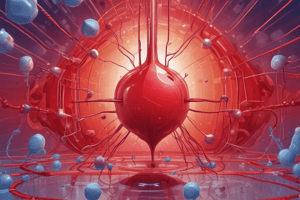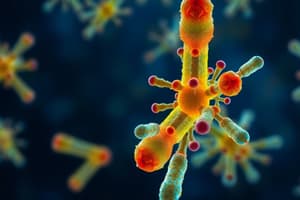Podcast
Questions and Answers
What is the primary purpose of antibody screening?
What is the primary purpose of antibody screening?
- To detect unexpected antibodies (correct)
- To diagnose blood-related disorders
- To determine the strength of antibodies
- To identify the type of antibodies present
What is the temperature used in the 37°C incubation phase of antibody screening?
What is the temperature used in the 37°C incubation phase of antibody screening?
- 40°C
- 37°C (correct)
- Room temperature
- 0°C
What is the purpose of the antiglobulin phase in antibody screening?
What is the purpose of the antiglobulin phase in antibody screening?
- To enhance the sensitivity of the test (correct)
- To detect IgG antibodies
- To identify the type of antibodies
- To detect IgM antibodies
What is the grading scale used to interpret the agglutination reactions in antibody screening?
What is the grading scale used to interpret the agglutination reactions in antibody screening?
What is the result of a positive direct Coombs' test?
What is the result of a positive direct Coombs' test?
What is the main difference between the tube method and the gel method of antibody screening?
What is the main difference between the tube method and the gel method of antibody screening?
What is a factor that can affect agglutination in antibody screening?
What is a factor that can affect agglutination in antibody screening?
What is the purpose of antibody screening in blood banking?
What is the purpose of antibody screening in blood banking?
Flashcards are hidden until you start studying
Study Notes
Antibody Screening
- Purpose: to detect unexpected antibodies in a patient's blood
Categories of Unexpected Antibodies
- Not mentioned in the text
How is Antibody Screening Performed?
- Method of antibody screening: Tube Method
- The tube method involves:
- Immediate Spin Phase
- 37°C Incubation Phase
- Antiglobulin Phase
Tube Method
- Immediate Spin Phase: initial centrifugation of the sample
- 37°C Incubation Phase: incubation of the sample at 37°C to enhance antibody detection
- Antiglobulin Phase: addition of antiglobulin to detect IgG antibodies
Grading of Agglutination Reactions
- Turgeon method:
- 0: no aggregates
- mf: few isolated aggregates, mostly free-floating cells, supernatant appears red
- Weak (+/-): tiny aggregates, many free RBCs, turbid and reddish supernatant
- 1+: a few small aggregates just visible macroscopically, many free erythrocytes, turbid and reddish supernatant
- 2+: medium-sized aggregates, some free erythrocytes, clear supernatant
- 3+: several large aggregates, some free erythrocytes, clear supernatant
- 4+: all the erythrocytes are combined into one solid aggregate, clear supernatant
- Harmening method:
- 0: no agglutination or hemolysis
- W+: tiny agglutinates, turbid background
- 1+: small agglutinates, turbid background
- 2+: medium-sized agglutinates, clear background
- 3+: several large agglutinates, clear background
- 4+: one solid agglutinate
Direct Coomb's Test
- Procedure:
- Steps 1-6 not mentioned in the text
- Interpretation:
- Positive: agglutination/clumping of red blood cells
- Negative: no clumping or agglutination
Factors Affecting Agglutination
- 7 factors mentioned, not specified in the text
Gel Method
- Procedure:
- Steps 1-9 not mentioned in the text
Studying That Suits You
Use AI to generate personalized quizzes and flashcards to suit your learning preferences.




